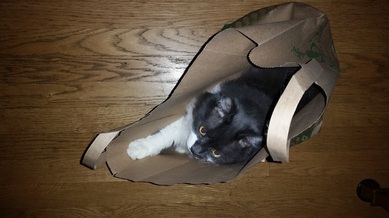 My cat, hiding from me. My cat, hiding from me. I got home at 6:30pm, after a long day of work. Angry. Hungry angry. Hangry. Even my cat was avoiding me. I went straight to the peanut butter jar, dug out the chocolate chips and went to town with my favorite sugar + fat snack. There was no way I could wait to make dinner. I needed a fix. It's hard to be graceful eating peanut butter out of the jar. I'm human, I fully admit it. My eating habits had a long way to go when I first started University, starry-eyed and bound for medical school. Over the first two years, I gained 15 lbs, started losing handfuls of hair, got easily overwhelmed and developed terrible sleeping habits. It was a rough go. By the time I started my Naturopathic medical training at the Canadian College of Naturopathic Medicine I had started making some very significant changes to diet. The biggest changes were cutting out processed crap (like the yellow powdered chicken broth that was previously a staple in my cooking), limiting wheat and increasing fat in my diet. Two years ago, however, I really hit the nail on the head. A colleague of mine, Dr. Erica Robinson, had been a big proponent of the Paleolithic Diet for quite sometime and it got me thinking. The Paleo Diet The Paleolithic Diet is based whole foods - lot of vegetables, a modest amount of fruit, lots of healthy fats and high quality protein - and is meant to simulate the way our ancient human ancestors during the Paleolithic era might have ate. At the same time, this style of eating limits ALL grains, beans and legumes, dairy, sugars, processed foods and alcohol. I know, it does sound drastic at first. Why would you do this to yourself??? We, as a species, have evolved over several hundred thousand years eating a certain way - foraging lots of greens, fruits, edible tubers, nuts and seeds, and when we could find it, meat including the higher fat organ meats. We moved a lot more, slept when the sun went down and had a heck of a lot more downtime to rest and play than we do today. It wasn't until the Neolithic era when agriculture really caught on that we started to settle down and dramatically increased the amount of grains and legumes in our diet. We stayed in one place, had a steady diet of grains, legumes and beans in addition to what those ancient ancestors ate. We had food security. Yes, that did happen thousands of years ago, however even that amount of time is only a small blip compared to the many years of eating in the hunter-gatherer style. The argument is that we are genetically evolved to be eating in this ancient, Paleolithic style, and our genetics are still playing a losing game of catch-up to our agriculture loving ancestor's grain and bean-based diet. Our DNA has no hope in hell to catch up with our modern diet full of genetically engineered wheat, corn, soy, processed fats, sodium, alcohol, antibiotic-laden dairy and other "food products". The Standard American Diet (SAD, for short) is forcing us to fight a bloody, uphill battle against our genetics... and it is one that we can't win. Numerous scientific studies have detailed that the SAD diet full of convenience but absolutely lacking nourishment are direct contributors to heart disease, diabetes, strokes, obesity and cancers amoung MANY other concerns. Yep, these are our biggest killers and we keep getting sicker, fatter, tired, depressed and miserable. So what did this peanut butter-loving Naturopath (to be) do? I read a LOT of books, including these: The Primal Blueprint: Reprogram Your Genes for Effortless Weight Loss, Vibrant Health, and Boundless Energy by Mark Sisson Paleoista: Gain Energy, Get Lean, and Feel Fabulous With the Diet You Were Born to Eat by Nell Stephenson The Paleo Solution: The Original Human Diet by Robb Wolf Practical Paleo by Diane Sanfilippo Make It Paleo: Over 200 Grain Free Recipes for Any Occasion - Bill Staley and Hayley Mason Well Fed: Paleo Recipes for People Who Love to Eat by Melissa Joulwan Dr. Loren Cordain's work and these blogs: Mark's Daily Apple NomNomPaleo Paleo OMG The Clothes Make the Girl I got rid of the grains, the sugar, beans, cut out dairy and threw out anything my great-great-great (x50) grandmother would not recognize as food. I increased the amount of produce I ate, set a limit of max 2 servings of fruit, dramatically increased the healthy fats, had high quality protein with each meal and got to work cooking. I seriously upped the quality of nutrition in my already "healthy" diet. I began to walk everywhere, made yoga a part of my day and allowed myself time to relax. I lost the 15 pounds of stress fat I put on through university and med school. I completely cured my insomnia. My acne cleared. My periods got more regular. I stopped losing handfuls of hair. I got used to saying "No thank you" to well-meaning friends and relatives offering me foods that made me feel ill. I felt truly empowered, knowing that I choose to take my health in my hands every day, that there are answers and that feeling ill did not have to be a given. And I was a heck of a lot more pleasant to be around. Are you interested? Book your free health consultation with me to start living the healthy life you know you deserve. “The food you eat can be either the safest and most powerful form of medicine or the slowest form of poison.” - Anne Wigmore Anne, you are right. I choose medicine. Awesome, tasty medicine. Check out how we do it! - Dr. Keila (no makeup Sunday) Xo
8 Comments
Food can be the perfect medicine... or the best poison.Our body does the best it can and can only run off the fuel we give it. While most of us try to eat healthily the majority of the time, sometimes the "good" foods we are regularly recommended can make us feel ill. If we are taking in foods that don't agree with us, regardless of which Food Guide or expert recommends them, our body will mount a reaction in order to tell us that we shouldn't eat it. If we continue to consume these foods, the body turns up the dial until we have to listen. Your Cheat Sheet to Food Reactions:
Timing is everythingOne reason it can be so difficult to identify a food reaction is that we may react hours, days or even weeks after ingesting the food in question. If you tend to eat a highly varied diet or eat the same foods over and over, pin-pointing that one meal can be a challenge, particularly if you started to feel crummy a few days later. Trust your gut..but look for other clues.The gut is the gateway to the rest of the body. If a food reacts in our gut, it impacts not only our digestive function, but the rest of our body as well. In particular, the immune system, neurological and reproductive systems get involved. Symptoms of a food sensitivity can include:
Your symptoms may evolve over time as well. For example, I notice with myself that when I eat gluten I start to feel very sleepy and have an immediate-onset brain fog. If I continue to ignore my body and eat more - I am the first to admit I am very human and not immune to a fresh slice of bread from time to time - I get some pretty intense stomach cramps and constipation. Since I so seldom eat it, I notice this right away. When I was in university on a tight student's budget, I tended to a lot of pasta (it was cheap, quick and filling) I suffered from debilitating sleep attacks plus all those digestive symptoms, weight gain around the middle and acne. Eventually I realized from trial and error that it was worth spending a few extra bucks, saving the gluten/starch binges for a very occasional treat in order to be more productive, focused, energetic and healthy. As you can see, it certainly goes beyond the digestive system! So how do I know if there's a problem... and what can I do about it?If you're asking yourself this, you've come to the right place!
Working with your family doctor or allergist, standard allergy testing is often recommended to test for IgE-type reactions. Treatment then involves taking an antihistamine (Reactine, Benedryl etc.), epinephrine (eg. carrying an Epi-pen) and/or complete avoidance. However, by now you will realize that IgE reactions are just a small part of the picture. Here is how I treat food reactions:
If you or someone you know is suspects that a food reaction might be contributing to feeling unwell, I would like to offer you a complimentary 15 minute consultation with me to discuss your concerns. BYou have a busy life, active family and a demanding job. You asked for more and I was listening. And I want you to know that I get it. Your health is important, but so is the rest of your life. That's why as of June 2014 I will be adding an additional set of evening hours for Naturopathic and acupuncture appointments to serve you better. So, if you work 9-5 and can't get out of the office, work alternating shifts or simply function better later in the day I can accommodate your schedule better than any other health care provider in Stratford, ON. Book your FREE 15 minute consultation and find out why Naturopathic Medicine can help you feel better than ever. You can learn more about Naturopathic Medicine here.  http://cdn.vogue.com.au/media/articles/7/2/0/7267-1_n.jpg?150136 http://cdn.vogue.com.au/media/articles/7/2/0/7267-1_n.jpg?150136 Irritable Bowel Syndrome (IBS) affects people of all ages, however females, and young adults are most likely to be diagnosed. Symptoms can range from cramping, bloating, diarrhea, constipation, incomplete voiding, mucous, nausea and heartburn. Canada and other more well-off countries tend to have much higher rates of IBS, representing a major quality of life burden. While many people are told that they have IBS (and that's that), they might not realize that there's more to it than a bathroom crisis. 1. IBS is not a diagnosis, it is a catch-all. In medicine, we call this a diagnosis of exclusion. This means that before IBS is diagnosed, we need to rule out more serious pathology like Ulcerative Colitis, Crohn's Disease, Colorectal Cancer, Celiac Disease and other immune related conditions. If you are suddenly experiencing a change in bowel patterns, including mucous or blood in your stool, have unexplained weight loss, fever and family history of colon cancer, this merits a thorough medical workup. In the absence of these things, IBS is considered a functional disorder, wherein you experience the symptoms (which can sometimes be very severe) but very little can be seen via labwork or exploratory imaging. 2. Irritable bowel syndrome can include constipation, diarrhea or both. The Rome-III Criteria are used to identify most cases of IBS. This includes recurrent abdominal pain or discomfort at least 3 days per month in the last 3 months, associated with 2 or more of the following:
3. You are what you eat - and what you eat matters! Many people with IBS know one or two foods that set them off, and are careful to avoid it. What you may not know is that your body might actually be having a full-on immune reaction to some of the foods you eat on a regular basis - causing the digestive upset and bathroom angst. Food sensitivities are quite common amoungst people with IBS and it is worth doing a trial elimination diet where you remove the typical offending foods such as gluten, dairy, eggs, soy, citrus, and pork for a period of time and then slowly reintroduce them back into your diet. There are tests to help determine which foods your body is reacting to as well - and these can be quite effective and simple to run. Processed foods, particularly those containing a lot of trans fats, sugars, salts and additives like MSG are the culprit for many people. A diet focused on lots of cooked vegetables, good quality lean protein and some healthy fats like coconut oil, ghee and olive oil can help decrease the severity of IBS. Likewise, a history of multiple rounds of antibiotics can predispose towards IBS as your own natural bacteria gets altered. Probiotics containing Lactobacillus can be helpful for increasing the amount and types of good bacteria in the gut and decreasing IBS symptoms. See a Naturopathic Doctor to decide which strains of probiotics are most appropriate for you. 4. Trust your gut Our guts are extremely sensitive to changes in hormones, including stress hormones like cortisol, and adrenaline and those related to mood like serotonin and dopamine. In fact, we also have a nervous system in our gut - the Enteric Nervous System - that also responds to the same chemicals that influence our brain. This means that when we are stressed out, it can definitely affect our digestive system on a molecular level such that we may feel the urge to go to the bathroom, lose our appetite or get unexplained stomach aches. When working with IBS, it is important to address the mind-body connection via stress management, like exercise, deep breathing, meditation as well as perhaps some botanicals and supplements to improve both your mood and belly. If your gut has been compromised by parasites, Candida, mould, bacterial or viral infections you may be more likely to have IBS either temporarily or in the future. A good treatment plan addresses the cause of your IBS and works on healing the gut. 5. Fibre might be the the answer - or your frenemy. People with IBS are often told by their family doctors and dieticians to increase fibre in their diet. The rationale is sound: more fibre = slower bowel transit time = less diarrhea. Fibre can also help to bind excess hormones, lower cholesterol, stabilize blood sugar and feed the good bacteria in the gut. On the other hand, too much fibre without large amounts of water to accompany it can easily sit like a lead weight in your gut and make you feel like you've swallowed a brick. It can also impair your absorption of vitamins and minerals - not to mention prescription medications - as it literally absorbs things around it. For people tending towards constipation, fibre can cause even more difficulty with bowel movements. The type of fibre needs to be considered as well. While wheat bran is readily available, many people are also sensitive to gluten and will feel worse taking it. 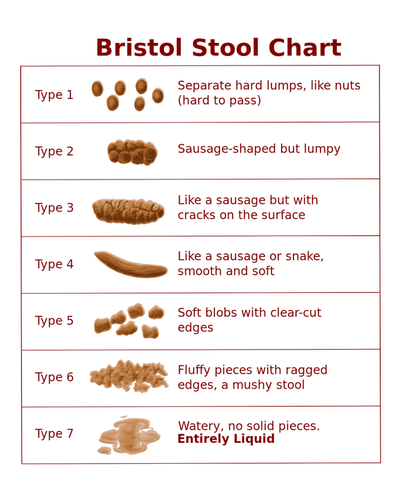 The Bristol Stool Chart is a commonly used visual to help people describe how their bowel movements look to their physicians. Here's the low-down: Type 4 is considered the "perfect poo" - soft, easy to pass, very few/no wiping needed. No cracks, or lumps, even in consistency and color. Type 1-3 equals varying degrees of constipation and dehydration. If we are dehydrated, our body will absorb water wherever it can. Given that our stool is mostly water, you can guess where our body gets some of that liquid. Gross. The longer stool stays in your colon, the more water gets reabsorbed, the drier it gets and more difficulty to pass. Type 5 is typical of people eating a mostly veggie based diet. Type 5-7 points towards malabsorption, food sensitivities or infection. If your stool is loose, runny or very frequent, it is likely that it is passing too quickly through the colon. Dehydration is also a concern as we can lose massive amounts of fluid via diarrhea. Eliminating foods that cause inflammation, treating infections or parasites, adding fibre, proper hydration and some botanicals to slow absorption can be very helpful in these cases.  If this looks a little more familiar to you, great, I'm all for everyone being on the same page. We may have also found out why you have IBS since processed foods like these often worsen IBS. If you or someone you know is experiencing Irritable Bowel Syndrome, please book a consultation with me to discuss your options. I have worked with many people experiencing a range of digestive issues using a blend of nutritional medicine, supplements, stress management techniques and acupuncture to help them experience lasting relief. 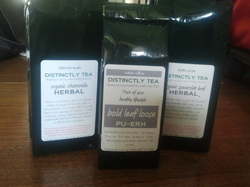 My loot from Distinctly Tea! My loot from Distinctly Tea! At the end of my first week of clinic I felt a little off. Let's just say that in my enthusiasm for my new practice that I wasn't eating quite enough. Add to that a little less time to prepare meals and I had a recipe for a few headaches and digestive unrest. No emergencies or anything, just not a feel-good combination. So what does a Naturopathic Doctor do when she gets sick? She opens her toolbox of course! My go to for any digestive-related distress has always been a cup of peppermint or spearmint tea. I can typically feel it working within a few minutes of having that hot steaming mug. Guaranteed. I walked downtown to my favorite tea purveyor, Distinctly Tea, on York Street. They have the best teas around and even when I was in Toronto studying at the Canadian College of Naturopathic Medicine, I would make the trek anytime I came back home into the store to fill up my home herbal dispensary. Call me loyal or stubborn, but it's the only place I go for my tea. Anyways, when I got there, I ordered a 100 g bag of my organic spearmint or, as I learned it in my training, Mentha spicata.. I also remembered that I was out of chamomile - another great digestive, calming herb that acts as a carminative. A carminative, for those not familiar with herbal medicine, is an herb that acts to release gas and settle an upset stomach. Highly recommended after any rich meal. I love Distinctly Tea's chamomile because it tends to be a lot less bitter than others that I've tried in the past. Did you know that the name "chamomile" is translated from the Greek words meaning "ground apple"? A good bag of Matricaria recutita does indeed smell of apples. Our amazing massage therapist, Samantha Mount, at the Stratford Health & Wellness Centre is a fan of Pu-erh tea. I remember learning that pu-erh in particular is great for tummy troubles too. In Traditional Chinese Medicine, the Spleen is responsible for transforming the food we eat and sending the nutritional components of it out to the body, to allow good circulation of Qi (the vital force of the body) and Blood, nourish the muscles and promote good mental energy. When the Spleen is distressed we can become fatigued, lethargic, have poor memory, have digestive upset and easy bruising. Pu-erh tea helps to nourish the Spleen and dispel "Damp"...a perfect pairing with my somewhat empty and un-restful feeling belly. With its earthy taste and calming aroma... and my full shopping basket I was ready to check out. I get home, make myself a combination cup of the pu-erh and peppermint. Guess what? Within five minutes, I could feel things start to get better. And this is what I love about being a Naturopathic Doctor: having the tools to treat all the little things that come up. I teach my patients how to manage their symptoms at home. I am a real believer in having people feel empowered about their health care, and feeling like they are in the driver's seat. I act as a guide, steering people through their concerns, but ultimately it is up to each of us to step up and take control of our health. Even if it's as simple as a making a cup of tea.  Day 1 accepting new patients at Stratford Health & Wellness Centre. I had my medical bag packed, white coat freshly ironed, my lunch packed and new patients booked for the day. "This is it!", I thought. My new office looks beautiful, albeit a work under construction, and I AM READY. In my first hour I had flowers delivered to me... all the way from California from the McCullough Girls. They were so beautiful and really helped to brighten up the room! It was a total whirlwind of a day..and I loved every minute of it, meeting my new patients, settling in, chatting with the other great practitioners here. Around 4pm, I remembered how awesome it was going to be to come home to my pot roast in the slow cooker. As a Paleo Diet/Cavegirl at heart, I truly value a good piece of red meat. Then I remembered that I forgot to remember to turn on the slow cooker! "Noooooooooo!!!!!!!!!" I don't think my voice reverberated quite as far as the Stratford city limits, but it had to have been pretty close. I definitely scared a few birds into migrating early. So what does a Naturopathic Doctor with a lust for red meat do in times of small appliance amnesia? She heads to The Butcher The Baker, of course! Strolling in at six o'clock with a wild I'm-about-to-go-into-a-meat-frenzy glint in my eye, Rick pointed me towards the sausage. I ordered ten of the big guys. Ever curious, I asked about the plain sausage in front of me. The ones that were begging me to eat them. Rick told me that they make all the sausage in-house and that all the meat is from the Perth Country area. The plain that I ordered truly was: pork, salt and pepper. Bonus - local, gluten-free, no weird additives. I practically skipped home with my bag of meat, and along with some oven-roasted beets, and leftover roasted pumpkin, we all ate dinner happily ever after. Next time, I'm trying the Beer & Bacon sausage!  Me, in my captain's chair...ready to help you! Me, in my captain's chair...ready to help you! Hi there! You! Yes, you! My name is Dr. Keila Roesner and I'm a Naturopathic Doctor... and I want to know how I can help you! With less than week to go before I begin seeing patients at the Stratford Health & Wellness Centre in my beautiful hometown of Stratford, Ontario, I'm feeling really excited. I've been busy launching my website www.KeilaRoesnerND.com, attending networking events through the Stratford Perth Centre for Business, renovating my office with the help of my ever-wonderful husband and meeting so many new faces in the last few weeks. What I've really noticed in this time is that everyone I talk to is curious:
Here's the thing. Each and every one of us tick a little differently. What works for your neighbour's arthritis might not work for yours. But we're all still curious. As a Naturopathic Doctor, my role is to help guide you through the overload of health information, and to weed out what works and doesn't. I am trained to assess, diagnose and treat patients from infancy to the nursing home, and together we create an individualized treatment plan that works for YOU. I welcome your curiosity about your health. Bring me your random questions, that stuff you felt embarrassed to ask about. Together, we can sit down and work it out. I also offer FREE 15 minute consultations so you can decide whether I can help you - just call (519) 271-8323 and our fantastic receptionist Melanie will set you up. Stratford Health & Wellness Centre 137 Albert Street Stratford, ON N5A 3K5 (519) 271-8323 I look forward to working with you! Forever curious, Dr. Keila Roesner ND |
Top 75 Naturopath Blogs & Websites For Naturopathic DoctorsAuthorDr. Keila Roesner is a Naturopathic Doctor. When not treating patients she is also an enthusiastic barefoot-strolling, music-loving, yoga-doing kitchen wiz - who also happens to be a wrestling fan. Categories
All
|
Let us take you from hormonal to whole.
|
Dr. Keila Roesner, BHSc ND
Naturopathic Doctor, Hormone Warrior and Your Wellness Cheerleader 247 Church Street, Stratford ON N5A 2R7 (519) 273-0900 [email protected] |
|

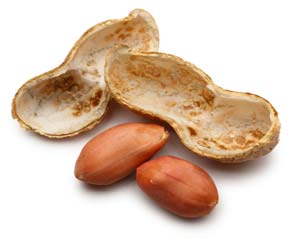
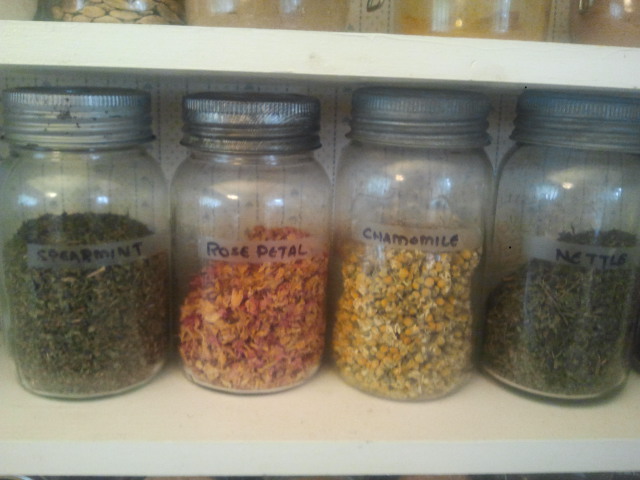


 RSS Feed
RSS Feed